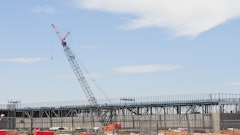If extending the credit limit of an organization that's borrowing 40 cents of every dollar it spends sounds like it might just be postponing and inflating an impending disaster, Wall Street's reaction to today's passage of a law that extends the U.S. government's debt ceiling will add to the foreboding.
Stocks tumbled today, handing the Standard & Poor’s 500 Index its biggest one-day loss in a year. It erased all of the S&P's 2011 gain. Bloomberg reported: "Treasury yields fell to the lowest levels since November, after an unexpected drop (0.2%) in consumer spending added to concern the economy will slide into a recession (raised by the slowest growth in personal incomes since November and yesterday's report showing American manufacturing had dropped to a two-year low)."
If there is any joy in D.C. today, it is Congressional and Administration gratitude at being spared very publicly shooting themselves in the foot. Failure to raise the federal debt ceiling would have ruined the federal government's unblemished credit rating and, by most accounts, have crashed the U.S. economy. While Fitch upheld the U.S. government's AAA credit rating, the agency reiterates that it will review how the U.S. carries through with deficit reductions promised in today's legislation.
Today's new law cut $917 billion in federal spending over 10 years. It also established a special committee of 12 congressmen to find another $1.5 trillion in cuts before Thanksgiving. The full Congress will then have until December 23 to approve or reject the committee's cuts – no amendments, no tinkering. Any failure of this process would trigger automatic cuts of $1.2 trillion in defense and discretionary spending (note that entitlement programs such as Social Security and Medicare remain insulated).
As contentious as Washington politics have become, future votes on spending reduction will likely come down to the final hours. And precedent suggests that Congress can and will vote to override triggers intended to motivate them to act by the manufactured deadlines.
The Washington Post's Ezra Klein calls it "a terrible, no-good, very bad deal" because, while the legislation does cut some spending, it doesn't touch entitlement programs that represent our biggest expenses, and it ignores economic context.
Gross domestic product grew at less than 1% in the first half of this year. Bloomberg reports Harvard University economics professor Martin Feldstein estimating a 50% chance that the U.S. will relapse into recession.
As recently as last week, Senator James Inhofe (ranking Republican on the Senate Environment and Public Works Committee) said this of the 34% cut in spending on surface-transportation improvement proposed by John Mica and the House Transportation and Infrastructure Committee: "The impact of that on jobs and the economy will be staggering."
Well before the "super congress," as the budget-cutting committee is coming to be called, is expected to remand cuts to Congress, the most-recent extension of surface transportation authorization will expire September 30. This could be a chance for our elected officials to do some real governing, although the ready excuse of the ongoing super congress' budget-cutting work is likely to be invoked. If so, it's hard to say whether Congress will deliver the eighth extension of SAFETEA-LU to carry it into its third year of extension, or if they will simply allow Highway Bill authorization to expire as they have the FAA authorization.
Our only hope for a refreshingly productive alternative response to the need for transportation reauthorization would be a public and industry bombardment of the White House and Congress with messages urging them to move quickly on Highway Bill and FAA reauthorization at spending levels that invest in not only our nation's economic recovery, but our long-term ability to compete in the global marketplace.
The U.S. is governed by representatives, rather than classic democracy, for times such as now: when decisions about where to spend and where to cut need to be made in the country's best interest over the clamor of special interest greed and ambition. It's time for politicians to consider all of the nation's difficulties and do the right Right Thing for the country, even if it does run counter to some pledge or party line they've been toeing.
Against All Odds, Congress Could Do the Right Thing
August 2, 2011


























